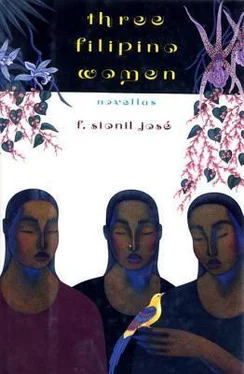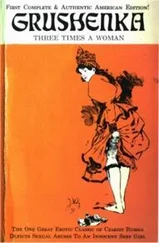Francisco Jose - Three Filipino Women
Здесь есть возможность читать онлайн «Francisco Jose - Three Filipino Women» весь текст электронной книги совершенно бесплатно (целиком полную версию без сокращений). В некоторых случаях можно слушать аудио, скачать через торрент в формате fb2 и присутствует краткое содержание. Год выпуска: 2013, ISBN: 2013, Издательство: Random House Publishing Group, Жанр: Современная проза, на английском языке. Описание произведения, (предисловие) а так же отзывы посетителей доступны на портале библиотеки ЛибКат.
- Название:Three Filipino Women
- Автор:
- Издательство:Random House Publishing Group
- Жанр:
- Год:2013
- ISBN:978-0-307-83028-9
- Рейтинг книги:4 / 5. Голосов: 1
-
Избранное:Добавить в избранное
- Отзывы:
-
Ваша оценка:
- 80
- 1
- 2
- 3
- 4
- 5
Three Filipino Women: краткое содержание, описание и аннотация
Предлагаем к чтению аннотацию, описание, краткое содержание или предисловие (зависит от того, что написал сам автор книги «Three Filipino Women»). Если вы не нашли необходимую информацию о книге — напишите в комментариях, мы постараемся отыскать её.
and
-examine the Philippine experience through the lives of three female characters, a prostitute, a student activist, and a politician.
Three Filipino Women — читать онлайн бесплатно полную книгу (весь текст) целиком
Ниже представлен текст книги, разбитый по страницам. Система сохранения места последней прочитанной страницы, позволяет с удобством читать онлайн бесплатно книгу «Three Filipino Women», без необходимости каждый раз заново искать на чём Вы остановились. Поставьте закладку, и сможете в любой момент перейти на страницу, на которой закончили чтение.
Интервал:
Закладка:
F. Sionil Jose
Three Filipino Women
FOR
Mochtar Lubis,
Sulak Sivaraksa and
Marcos C. Roces
CADENA DE AMOR
ONE
In the preparation of my study on Narita Reyes, I am indebted to my colleagues, particularly to my former teachers, Professors Alejo Orina and M. D. Guerzon who read the manuscript and gave valuable advice. I am also grateful to my typist and secretary, T. Jovel, who transcribed most of the tapes, changed my “alright” to “all right,” and kept the door closed to all sorts of noise. And last but not least, I am grateful to the Narita Reyes Foundation for its generous support that allowed me a trip to the United States for research and interviews, and provided for the publication of the political biography of a woman whose personality has considerably altered our view of domestic politics during the last decade.
When I started this project, I was faced with the problem of objectivity. I had known Narita all my life and if I just hewed closely to what is observable data and behavior, I would do injustice to a woman who was far more complex than those personality profiles that the mass media presented. There was much more in what Narita did as compared to what she said; she was sparing in her words and let her actions speak instead.
This much shorter narrative is a spin-off, different from the lengthier and documented original. Nevertheless, with this format, I hope to present one of the most unusual personalities in contemporary Filipino society, in all her scintillating uniqueness.
I have always admired Narita Reyes even though at times it had to be from a distance. As is often said, Ligaw tingin, kantot hangin (courtship by looking, fucking the wind). One reason for this is that she made me feel inferior, a result I think of the fact that when we were in grade school, though we were of the same age, she was taller than I was. It was a feeling which persisted through the years, vanquished only in those rare instances when I could physically express my fondness for her.
Narita was an only child and she lived with her mestizo (half-breed) parents in a small house roofed with rusting tin across the street from ours. Their house which had a brick wall was once the kitchen — all that was left of a much more substantial house that had burned down. The ruins still stood in the wide lot fenced with brick that had fallen apart in places. Her grandfather was once a wealthy landlord but had lost his lands because of gambling and women; all that remained was the wide lot overgrown with weeds, with pomelo and guava trees which hid their house from view. Narita’s father clerked in the municipal building while her mother sold meat in the market, and when Narita was not in school, she helped her mother run the stall.
Narita and I were both Sagittarians; we were born almost to the minute, in the wee hours of the morning of November 30, 1933. Father, who made the deliveries, said it was a hectic dawn — what with him having to rush from our house to theirs and back.
Narita was often in our house for, like me, she liked to read. Father’s library included a set of The Book of Knowledge , some novels, back issues of The National Geographic and other magazines. I was always playing in their wide, weed-choked yard, too, particularly when the guava and pomelo trees started bearing fruit. During the early days of the war, in 1942, her family evacuated with us to our farm in Bogo which was about three kilometers from the town. We did not stay there long; we need not have left town for the Japanese never came to Santa Ana in force except for occasional patrols. As a matter of fact, Santa Ana is quite isolated from the rest of the country and progress really never seemed to have touched it — till Narita came and blazed through in a way Santa Ana will never see again.
For one, the land in our part of the island is rocky and the mountains always seemed to loom closer as the irrevocable margin beyond which our cane fields could not encroach. We depended on the rain for irrigation and sometimes, it was niggardly. And because the land is poor, we never had the largesse that the Silay and Bacolod people enjoyed. In fact, Bacolod could seem as distant as Manila although it is only sixty kilometers away and the only people who went there regularly were men like Father who had business at the provincial hospital or with the drug companies.
Narita could be very quiet. We could be with those books without speaking for hours; yet afterwards, people thought she was a compulsive talker. This was unfair for in later years she could be a patient listener even to the loudest braggart, as if she were hearing words of pure wisdom when they were pretentious drivel — as they often were when most of the politicians she knew wanted to be identified as pious nationalists.
She was in Grade II when she became champion declaimer with her tearful rendition of “The boy stood on the burning deck …” When she was in Grade VI, she was chosen the best singer with her “Lahat ng Araw” (“All of My Days”) — a song she made very popular later. Her voice was scarcely trained but she could render a song better than most of the young singers on radio and TV today because Narita had style.
Even when we were still in school, it was already obvious that she was beautiful and talented but because we were neighbors, I took her for granted. We played a lot, in whatever season. When the rains came and brought green to the fields, we would be there, catching grasshoppers. And at dusk, we looked for spiders in the bushes, in the profusion of cadena de amor that clambered over the brick walls and bloomed in white and pink. There was a particular species of spider that we found among the vines, the one with long limbs and a very small body. It was a good fighter. We would position the spiders on each end of a coconut midrib, watch them inch towards the center and once there, they would grapple and bite each other. The loser was soon rendered immobile and coated with the silky strands that trailed from them. Never was defeat so complete and final.
Narita’s mother supplied us with meat and Mother said she was trustworthy; she gave us the best sections and told us if it was carabao or beef unlike other butchers who cheated their customers. I took this as a matter of course; after all, Father did not charge them for his services.
Their house was always in disarray — a characteristic that Narita did not bring with her later: their clothes all over the place, the bamboo floor already rotting in places, the dishes unwashed in the basin in the kitchen. But there were plants everywhere for Narita loved to grow them, even the weeds in the yard, I think. It was as if by some arcadian magic, she could transform an ordinary place into lush green. She had the touch of life.
When we were in Grade VI, I made a “mark” on Narita. We were playing that Saturday morning in their wide yard. She was then tomboyish and it was not unusual for her to beat me in running, jumping and that morning, basketball. She had rigged up a hoop on one side of their house, up the brick wall. I accidentally pushed her and she stumbled and banged her chin against a rusty piece of iron in the woodwork. When she turned to me, although she was laughing, there was blood on her chin. It turned out to be an ugly wound and, with her handkerchief staunching it, we went to Father who was in his clinic in the ground floor of our house. He looked at the wound, gave her anaesthesia, then sewed it in two stitches all the while asking how it had happened. Narita did not cry, wince or scream as I would have done with all that pain and blood.
“Brave girl,” Father said.
Читать дальшеИнтервал:
Закладка:
Похожие книги на «Three Filipino Women»
Представляем Вашему вниманию похожие книги на «Three Filipino Women» списком для выбора. Мы отобрали схожую по названию и смыслу литературу в надежде предоставить читателям больше вариантов отыскать новые, интересные, ещё непрочитанные произведения.
Обсуждение, отзывы о книге «Three Filipino Women» и просто собственные мнения читателей. Оставьте ваши комментарии, напишите, что Вы думаете о произведении, его смысле или главных героях. Укажите что конкретно понравилось, а что нет, и почему Вы так считаете.












